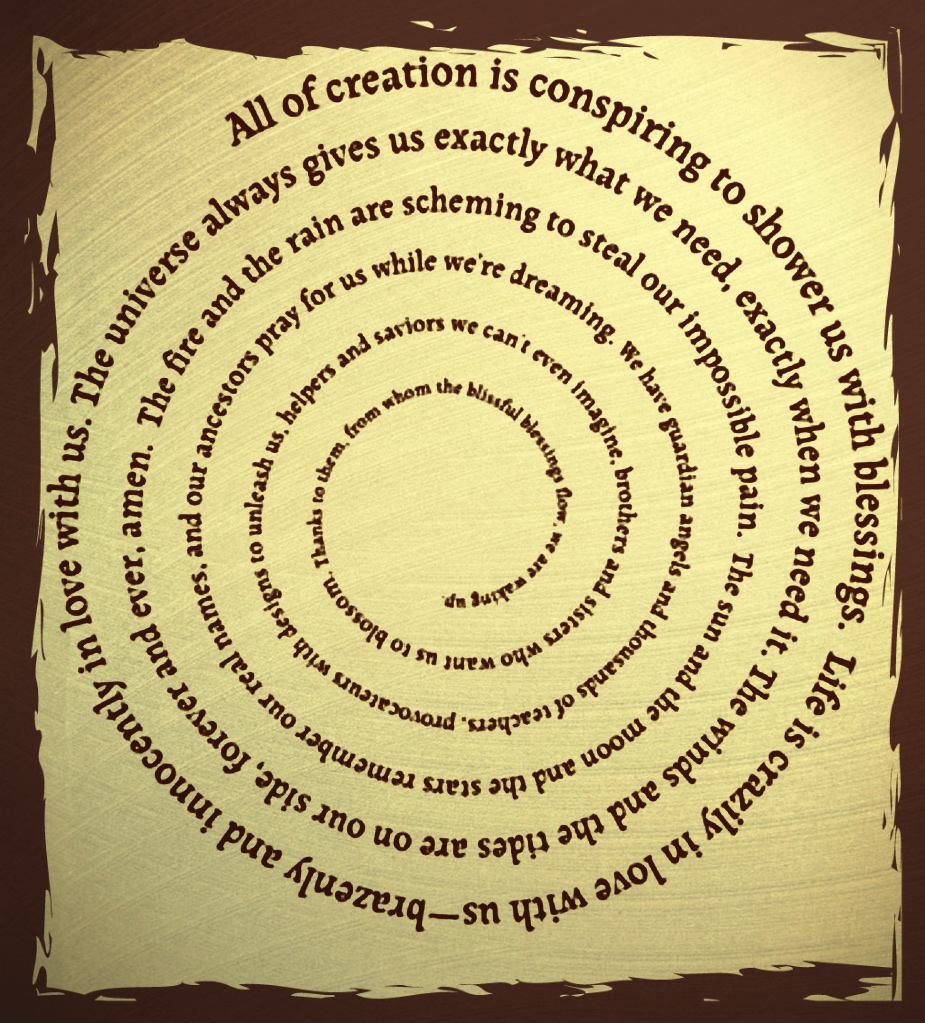
Why Altruism is good for your health.
February 2018
One of the projects that I am working on this year is being on the steering committee for an organisation called Campfire Convention.
Campfire Convention is a community of like-minded people who believe that individually and collectively we can shape a better, fairer world. The on-line social network and real world gatherings bring members together, enabling them to share ideas and skills and initiatives, and to campaign for non-partisan social change. A truly modern cooperative that is totally independent of commercial imperatives. Campfire Convention’s path will be determined by the hopes, aspirations and efforts of the community.
The idea of supporting a community of communities is very much aligned to my own values and principles.
One of Campfire Conventions projects is called the ‘Global Beacons’, this is a series of events that will happen across the globe on June 21st.
I love the Global Beacon project, I think it’s a fantastic thought that there will be people from all around gathering on the same day to set an intention to make a difference; for themselves, for their families, their communities & the people around them.
Yet, did you know that altruistic acts can change for the better the way you experience the world and are good for your health? Not only do altruists & volunteers tend to live longer, they are also physically and emotionally healthier.
The article is here in full:
A generous man will prosper, he who refreshes others will himself be refreshed.” Life can be difficult, and death should not be denied. Love, however, makes the way easier and healthier both for those who give and for those who receive.
“All of creation is conspiring to shower us with blessings…”
Rob Brezsny
Last week in our Campfire Facebook group @Kimm Fearnley stated a discussion on kindness, starting with the simple question: “tell of your acts of kindness”.
It’s a brilliant question and something that I often reflect on. I have been thinking about the concept of ‘random acts of kindness’ for a few years now. It’s something that I try and live by, Smiling at people, letting someone in front of me in a queue when it makes no difference, holding doors open, helping people with directions, asking people if they are ok if they clearly look lost, small little things…
The concept of charity and kindness is deeply routed inside my culture and of course is the bedrock of most spiritual and religious philosophy.
“Do unto others” is hardly a new concept… That’s for me, why I love the Campfire Beacons initiative, I love the idea that we will be gathering on times of the year where we communally would historically gather, (Equinoxes and Solstices), for the benefit of creating and strengthening the value of community in today’s society as well making pledges about making a difference, all while having a good time.
Utterly brilliant!
From my work I understand from a psychological perspective how bringing kindness into the world is a positive thing. How participating in a Beacon is psychologically healthy:
Reality, as we experience it, is a construction. Out there in ‘reality’ is a soup of quarks and quantum events.
Through our senses we experience the world; we see less then 1% of the electromagnetic spectrum and hear less than 1% of the acoustic spectrum.
The keyboard I am typing this on has no intrinsic color, that is a construction of my human brain. I am not even really seeing it, it is an event that is happening within my occipital lobe and at various connected points in my neurological system.
In 1931 the Polish Philosopher and Mathematician Count Alfred Korzybski said:
A map is not the territory it represents, but, if correct, it has a similar structure to the territory, which accounts for its usefulness.
— Alfred Korzybski, Science and Sanity (1933, p. 58)
Essentially we are at a fundamental level creating good enough maps of reality. They may be good enough but they are still an approximation based on our neurology.
What Psychotherapeutic Theory has added to this concept is that we not only filter our reality through our senses but we then add in our unconscious filters created by our families, the culture we were born in and the culture we live in, our social-economic status, our jobs, our friends, our aesthetic taste etc.
All of these filters can be generative or degenerative depending on our relationship to them; our emotional state.
There was a study at the Stanford University Hypnosis Research Laboratory in 1978. They hypnotically put subjects into different emotional states and then asked them what they remembered. I don’t think you would be amazed to hear that people in ‘happy emotional’ states remembered happy things, people in ‘sad emotional’ states remembered sad things.
Therefore our emotional state will unconsciously filter how we experience the world.
The psychologist Richard Wiseman did a series of experiments on luck. Essentially people who self identified as being lucky, would do better is his experiments
Again, the research shows that if we see ourselves as being lucky, the more lucky one will be!
So, being kind, doing something altruistic, joining in community with other people to make a difference out in the world will improve your mental and emotional wellbeing.
Not only will it effect you on personal level it can have the effect of changing the culture we live in. We have a social contract in our culture that underpins that rules that we live by. Living in London it’s not the ‘norm’ to offer kindness. Yet, we are all part of this contract, it’s a live in the moment evolving thing, if more people acted in a more loving, kind and compassionate way, then we can change what is ‘the norm’…
Big acts of kindness are amazing! But so are the little things, the more that we act, the more things change. Being part of a local beacon and coming together to celebrate the solstice is a set of small acts of kindness as part of a big communal act of kindness.
When doing some background reading for this article I came across this amazing piece of research:
Essentially it discusses how: “A growing wave of research is proving the powerful benefit of altruism on both mental and physical well-being, as well as providing plausible explanations for why we observe what we observe, from the age-related benefit of altruism to why altruism exists at all.”
The conclusions are that:
“..a strong direct correlation and high probability of causality exists between the well-being, happiness, health, and longevity of people who are kind and compassionate in their charitable helping activities, so long as they are not overwhelmed. Of course, this is a population generalization that provides no guarantee for the individual. Yet, there is wisdom in the saying, “A generous man will prosper, he who refreshes others will himself be refreshed.” Life can be difficult, and death should not be denied. Love, however, makes the way easier and healthier both for those who give and for those who receive. And evolution is on your side.”
So:
If you want to live longer..
If you want to experience more kindness and generosity in your world..
If you want to have a more generative relationship to yourself..
Then…
Come and take part, light a Beacon with us on the Summer Solstice!
